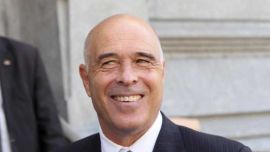One of the frustrating things about negative cycles is that you’re constantly reminded of what you’re lacking.
Currently, we’re clearly in need of a bunch of second components of the Sputnik V vaccine, as Presidential Advisor Cecilia Nicolini made clear this week to the Russian Direct Investment Fund (RDIF), which controls the commercialisation of the shot developed by the prestigious Gamaleya Research Institute of Epidemiology and Microbiology.
Another thing Argentina is desperately in need of is dollars in a world awash with greenbacks amid negative real interest rates. Hand-in-hand with the heat of the electoral campaign, the value of the black market 'dólar blue' has picked up steam in recent weeks — despite additional currency controls put in place by the Central Bank — as it nears record levels and drags the spread over the official peso-dollar exchange rate north of 90 percent. Economy Minister Martín Guzmán has apparently promised the president and his veep that he has the firepower to keep a lid on the exchange rate until the elections, (which seems the only thing that matters to the political class) begging the question the question about how much the government will devalue after the electoral bout.
And then, underpinning our most essential shortcomings, of course, is justice, made graphic by the concession of parole to none other than former vice-president Amado Boudou, a serious crook who claims he is the victim of crooked justice, while painting himself as a political prisoner and martyr for the cause. Oh dear.
Starting with the vaccines, a private email between Nicolini and her counterparts in the RDIF was leaked in which she emphatically demanded the arrival of more vaccines, particularly the second doses for the 6.6 million citizens who’ve received the first jab and trend substantially toward the older part of the curve, meaning they are the riskier groups. The letter, published by La Nación’s Carlos Pagni, read like a desperate plea, with Nicolini begging the Russians to respect their obligations and deliver the doses. She sprinkled it with toothless “threats” such as the possibility of cancelling the contract or the agreements that would be signed with US pharma companies. Nicolini asked the RDIF for the latest delivery schedules after seven months of delays, for protocols to run paediatrics studies in order to vaccinate children, and “vaccine cocktail results with Astra,” in order to study the possibility of combining doses with Sputnik V. The adviser notes the risks of the contract cancellation, of public prosecution for her and other public officials, and rejects a request to bill Argentine pharmaceutical firm Laboratorios Richmond directly instead of Human Vaccine/RDIF, with whom the original deal was signed. The opposition sought to take advantage of the airing of the letter to have a stab at the government’s amateurism, while claiming Nicolini was trying to threaten Vladimir Putin.
The letter lays bare the desperation of the situation with Sputnik V. As Pagni himself observed, the lack of shortages of the second component are stretching beyond the recommended intervals, putting the efficacy of the jabs at risk. Argentina is far from the only country having delivery issues with the vaccine developed by Gamalyea though. A recent piece in Fortune magazine documented how Guatemala, the Philippines, and Mexico have all experienced serious delays, attributing it to the difficulty of developing two different components together with a surge in vaccine demand, especially from Russians themselves. And, of course, the shady business regarding intermediaries reselling Sputnik V has just begun, as The Moscow Times has reported. Middle to low income nations including Kenya, Ghana, Guyana, Lebanon, and Pakistan have all been offered or sold Sputnik V at huge mark-ups by intermediaries tied to the royal family of the United Arab Emirates. Wait for the blood to make it to Argentina.
In part, the problem has to do with dollars, or a lack of them. While several powerful countries in the northern hemisphere overstocked themselves with vaccines to the point where they are now giving them out “for free” — i.e. in exchange for political allegiance — nations like Argentina have extremely limited firepower. That doesn’t excuse Nicolini and the Fernández-Fernández administration for having preferred Sputnik V and AstraZeneca over other vaccines such as Pfizer and Moderna, but it puts into context the relative scarcity of jabs, which in turn pressures the economic cycle. Over the past few weeks, the so-called “pax cambiaria,” or exchange rate stability, that allowed for a very sluggish decline in inflation and a timid recovery in economic activity has been disturbed by turbulence. Argentina’s legacy fear-gauge – the value of the “free” dollar, which in this case is the black market blue chip – has started to climb. As usual, several factors are at work, including the seasonal decline in export liquidations, as well as the proximity of tumultuous and uncertain elections which the government will face by trying to “put money in people’s pockets.” The internal power-struggle between Guzmán and his belt-tightening and Buenos Aires Province Governor Axel Kicillof’s populist statism has definitely been sealed. The Columbia University academic knows he must help the ruling Frente de Todos coalition get as close to winning the elections as possible, which means the reopening of collective wage negotiations and fiscal stimulus, along with stricter currency controls including a sharp reduction in imports. The idea is to keep the Central Bank’s firepower in reserve, so that its president Miguel Ángel Pesce can have as much wiggle room as possible.
So what happens on November 15, the day after the elections? The outcome is very important, as a sensation of victory by the opposing Juntos por el Cambio coalition — which is beginning to appear more plausible — could boost investor confidence. Yet, the artificially slower devaluation of the official peso-dollar exchange rate means a hard devaluation could be in the books.
Which ultimately brings us back to Mr. Boudou, one of the most corrupt characters within Kirchnerism. He was granted parole after having served two-thirds of his conviction for illegally acquiring a company that prints legal tender — quite the irony — and now fills his mouth speaking of political prisoners and lawfare. Not even his former running mate, none other than Cristina Fernández de Kirchner, stands to defend him today. His situation, and the Judiciary’s decision to “forget” to investigate other accusations against him, perpetuate a sensation of a free-for-all for whoever’s in power. This vicious cycle affects every other element.



















Comments